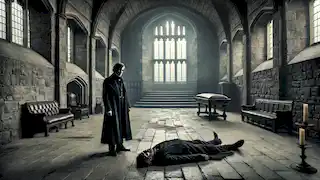In the gloomy depths of 19th-century Europe, beyond the grasp of reason and science, the tale of Sardonicus is born. It is a story woven with threads of madness, cruelty, and the grotesque—where the shadows of human nature hide unspeakable secrets and grim consequences await those who tread too far into the darkness. Our story opens with the summoning of a celebrated London physician, Dr. Robert Cargrave, whose knowledge of the mind and body is about to be tested beyond the limits of mortal understanding. Dr. Robert Cargrave, a man of profound intellect and measured composure, sat in his study on a rainy evening in London. His thoughts were preoccupied with the many cases of medical mystery he had encountered in his career when a letter arrived from an unexpected source. It bore the signature of Maude Randall, a woman he had once loved deeply but whom life had torn away from him. She now lived in a faraway castle as the wife of a Baron named Sardonicus. The letter was brief and filled with urgency. Maude implored Cargrave to come to her aid, to travel to their remote home, for her husband suffered from a strange and terrifying affliction. The details were vague, but the desperation in her words was unmistakable. Without hesitation, Cargrave packed his bags and embarked on a journey into the unknown. The journey took Cargrave far from the comforts of civilization. As the landscapes around him became more desolate, a sense of foreboding crept into his heart. The castle of Sardonicus loomed ahead, perched on a hill like a predator waiting to devour the souls of those who approached it. Upon his arrival, Cargrave was greeted by a hunchbacked servant named Krull, whose grotesque appearance was matched only by his cold demeanor. Krull led him through the dim, cavernous halls of the castle until they reached the chamber where Maude waited. She had changed since he last saw her—pale, her eyes shadowed with fear. She embraced him with a tremor in her voice, whispering that things were worse than she could have explained in her letter. It was then that Cargrave was introduced to her husband, the Baron Sardonicus. His appearance was a horror beyond comprehension. His face was frozen into a hideous grin, the skin stretched taut over his skull, his lips pulled back in a perpetual sneer. His eyes, wide and unblinking, seemed to pierce into Cargrave’s very soul. Sardonicus explained, in a voice both bitter and resigned, that this curse had come upon him years ago and that all efforts to cure him had failed. Now, he pinned his hopes on Cargrave’s medical expertise. Over the course of several days, Cargrave probed into Sardonicus’s condition, examining both the physical and psychological aspects of his ailment. Sardonicus was not only a victim of a grotesque disfigurement but also a man consumed by fear, guilt, and desperation. In one particularly unsettling evening, over dinner in the grand but decaying dining hall, Sardonicus revealed the dark tale of how his affliction came to be. He had once been a poor man, a commoner named Marek, living in squalor with his wife and struggling to make ends meet. His father, a cruel and miserly man, had left a considerable sum of money buried in his grave when he passed away. Driven by greed and the desire to lift himself out of poverty, Marek had exhumed his father’s corpse to retrieve the money. The act of desecrating his father’s grave had an immediate and horrifying consequence. As Marek pried the gold coins from the skeleton's grip, his face contorted into the hideous smile he now wore, and he became the Baron Sardonicus. Maude, now married to this monster, had fallen into a life of fear and hopelessness, trapped by the man she once believed she loved. Cargrave, though horrified by what he had learned, resolved to help her escape Sardonicus's clutches. Driven by his scientific curiosity, Cargrave began devising treatments to reverse Sardonicus’s condition. He experimented with various nerve stimulants, believing the affliction to be a result of some obscure nervous disorder. However, none of his treatments had any lasting effect, and Sardonicus’s condition seemed to grow worse as his desperation deepened. Sardonicus, sensing the futility of Cargrave’s efforts, grew more tyrannical. He demanded results and began to speak in ominous tones about the consequences if Cargrave failed him. Maude, meanwhile, grew increasingly afraid for Cargrave’s safety as she revealed to him the extent of Sardonicus’s cruelty. Sardonicus kept a collection of grotesque masks and instruments of torture in a secret chamber, which he used to inflict suffering on the helpless souls in his domain. As the days dragged on, Cargrave realized that his only option was to find a way to free Maude from Sardonicus’s control. He devised a plan that would allow Maude to escape the castle under the guise of seeking refuge in a nearby town, while Cargrave would confront Sardonicus one final time. In a tense and fateful confrontation, Cargrave presented Sardonicus with what he claimed was a final, experimental cure. Sardonicus, blinded by his desire for relief, agreed to undergo the procedure. However, Cargrave had no intention of curing him. Instead, he administered a powerful sedative that would immobilize Sardonicus long enough for Maude to make her escape. The plan worked. Maude fled into the night, and Sardonicus, weakened by the sedative, was left vulnerable. But Cargrave’s actions were not without consequence. Sardonicus, in his delirium, vowed that his curse would live on, that his grotesque smile would remain etched into the memory of those who wronged him. In the cold and desolate castle, Cargrave faced the monstrous Sardonicus one last time. Sardonicus’s voice, now little more than a rasp, echoed through the darkened halls as he revealed the full extent of his malevolence. He had used his wealth and power to destroy lives, to bring suffering to those who crossed him, and now he intended to make Cargrave pay for his betrayal. But Sardonicus underestimated the doctor’s resolve. Armed with his knowledge of human anatomy and a sense of justice that had grown over the course of his time in the castle, Cargrave used the tools at his disposal to render Sardonicus powerless. In a final act of defiance, Sardonicus attempted to rise, his face twisted into an even more grotesque version of the grin that had plagued him for years. But his body, weakened by years of cruelty and despair, collapsed under the weight of his sins. Cargrave left the castle, never to return. He would carry the memory of Sardonicus with him for the rest of his days, haunted by the knowledge that some curses could never be fully lifted. Maude found refuge in a quiet village far from the castle’s shadow, where she lived the rest of her days in peace. Cargrave, though relieved that Maude had escaped, was forever marked by the events he had witnessed. He returned to London, but his work no longer brought him the same sense of satisfaction. The memory of Sardonicus’s twisted grin haunted him, a reminder of the price of unchecked ambition and the darkness that lay within the human soul. As for the castle, it remained standing, a decaying monument to Sardonicus’s cruelty and madness. The locals spoke of it only in hushed whispers, and few dared to venture near its crumbling walls. Those who did claimed they could still hear Sardonicus’s laughter echoing through the night—a laughter that carried with it the weight of a thousand unspeakable sins. In the end, Sardonicus’s curse was not just his own. It was the curse of all who had crossed his path, a curse that would linger long after his body had turned to dust.The Summons
The Arrival

The Curse Revealed
The Experiment

Maude’s Escape
The Final Confrontation

Epilogue: The Price of Guilt

Sardonicus" by Ray Russell
Reading Time: 7 min

About Story: Sardonicus" by Ray Russell is a Historical Fiction Stories from set in the 19th Century Stories. This Dramatic Stories tale explores themes of Redemption Stories and is suitable for Adults Stories. It offers Moral Stories insights. A tale of greed, guilt, and the grotesque, where a twisted smile hides unspeakable horrors.


















